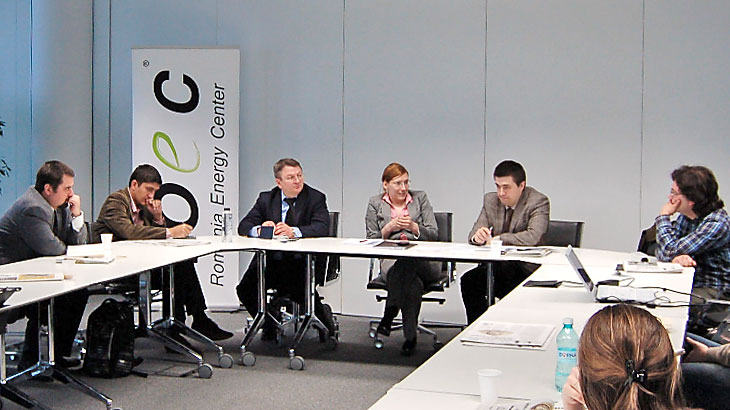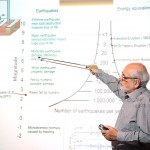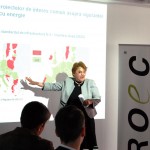###author###
“The Romanian regulatory framework for the oil and gas industry is like a bowl of spaghetti; you pick one end, you never know where it ends – you only know it is going to get even more complicated”. That is one of the confessions the participants at this year ROEC Executive Class had the chance to hear.
Most of us were rather young and inexperienced in the energy ins and outs, however interested in becoming more knowledgeable in the field. The sentiment was strengthened by the lecturers’ weight: most of them seasoned industry experts and well trained in turning challenges into opportunities. They shared in-depth knowledge of the subject matter with elegant broad perspectives and spectacular insights.
More than the specifics on energy, they proved us once again that we all have access to more or less the same data. It is the interpretation that makes all the difference. Here are some lessons I had to opportunity to grasp during the sessions that I attended.
There are no shortcuts
All the experts engaged in explaining the conundrum at the center of the Romanian energy industry. They came with numbers, they came with renewed explanations for concepts and phenomena, they invoked personal stories – funny, sarcastic or sad – most of the time illuminating. What struck me was the double discovery that 1. most of us in the class were aware of the essential parts of the big picture, and 2. every lecturer insisted on the same single fact: the importance of having and following a plan for achieving big, if any result.
In energy, the timeframe is calculated in decades; without a well thought planning (and big money to invest) there is no chance to produce energy. Acquiring the rights, exploring, developing, producing takes time (10 years at least between the start of operations and the first cent in revenue), with a “4 out of 5” rate of failure in deepwater exploration wells. This is a rigorous step-by-step process verified in over a century and in hundreds of places. The investor comes with the technology, the integrated solutions, financial capabilities, worldwide experience and savvier safety and environment standards. The governments are expected to provide effective institutional structures, a clear and stable policy for growth opportunities, open and competitive markets. When one is lacking, there is a problem.
Beware of the dead ends
A perfect example is the much discussed “energy independence”. A powerful political / populist formula, but not a technical or a business issue. People in the industry prefer the term “energy security”, since it provides an economy with a variety of energy sources and alternative forms of supply and transportation. This ensures reliability, enforces competition and allows prices to decline.
But with energy being the “lifeblood of the economy”, politics can’t stand too far away. Most of the US top politicians have strong links to the energy sector (“there is a ‘revolving door’ between the energy sector and public administration”). Politics and business are intertwined. In Russia, the political leadership depends on oil and gas for controlling the locals and threatening the neighbours (Vladimir Putin wrote his PhD thesis on energy as a political weapon), while China, with not enough mineral resources and arable field for its huge population, is “a vacuum cleaner for resources from everywhere”.
Everything is ripe now for politicians to have more rules imposed on the global energy market in order to establish new relations among producers, transit countries and consumers. The Crimea outburst is much less of a surprise when one notices (or benefits from the explanation) that in Ukraine all three instances can be identified: new relations among producers, transit countries and consumers are at stake.
Other forms of outside interference are more common in Romania: poor allocation of financial resources, constant change in regulatory framework, lack of vision in coordinating, implementing and monitoring agencies, sectors or state-owned companies. And recently, the gaps in public acceptance of the energy projects grow more and more important: from E&P activities, nuclear plants extension, to cable laying and installing electricity pylons, local communities’ opposition tend to become the new normal.
Unaddressed, this tendency might end the Romanian energy story.
Keep your eye on the goal
The feeling I had listening the lecturers – especially those with a strong industry background – is that confidence and perseverance are the most important ingredients that make the winners.
When thinking about large timeframes, one is less vulnerable to emotions and anxiety. “Most of the energy businesses have a longer life cycle than politics”, noted one CEO. All that seems difficult, improbable, or even impossible now might be different 3 or 5 or 7 years later.
There is enough gas in the world for the next 200 years. The renewables are the big promise – and for good reasons. Technology has spectacular advances every 5 years. The number and the quality of the people involved in the energy industry worldwide are stunning. The demand is constantly on the rise. It only takes time, money and a grain of good will in order to succeed, for constant pressure reveals the way.
For me, this seems to be the best achievement of this year ROEC Executive Class: providing attendees with a truly inspiring experience.
The lecturers and guest speakers of the ROEC Executive Class 2014 were:
- Sergiu Celac (diplomat, former Minister of Foreign Affairs)
- Otilia Nuțu (Senior policy analyst, Expert Forum)
- Ionuț Purica (Romanian Academy,Institute for Economic Forecasting)
- Eugenia Gusilov (Founder and Director of Romania Energy Center)
- Nicolae Anastasiu (Faculty of Geology and Geophysics, University of Bucharest)
- Varinia Radu (Founder and Managing Partner of RVR Energy)
- Armand Goşu (Bucharest University, editor in chief „22” weekly)
- Octavian Milewski (Political scientist specialized in post-Soviet area studies)
- John Knapp (Managing Director ExxonMobil Romania)
- Carmen Neagu (Member of Supervisory Board Transelectrica)
- Cristian Secoșan (OMV Petrom EB Member)





